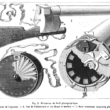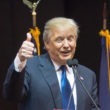Yet Another Media Monopoly—The Comcast Corporation, already the largest cable-TV titan, with 22 million subscribers, is planning to tighten its hammerlock on what news and entertainment Americans can receive. It is trying to buy the Walt Disney Company, which includes the ABC radio and television network, and Disney’s movie studio and theme parks, for $56 billion.
Whether the Federal Communications Commission (FCC) will intervene to limit or block the merger, unwelcomed by Disney, is unclear. But the top two members of the Senate Judiciary Subcommittee on Antitrust, Competition, and Business and Consumer Rights, Senators Mike DeWine (R-OH) and Herb Kohl (D-WI), issued a joint statement saying that the takeover effort “may well pose a risk to competition in the marketplace of ideas and the diversity of news, information and entertainment available to the American public.”
By taking over Disney’s ABC network, Comcast, which already has 22 million cable subscribers, would become in several cities the only carrier offering cable service, as well as owning one or two on-air TV stations.
In Court—The Comcast-Disney scrap came as the FCC came under challenge for broadening the limit on the number of TV and radio stations that could be owned by one company (see theWashington Spectator, July 1, 2003). Public interest groups came before a three-judge panel of the U.S. Court of Appeals for the Third Circuit in Philadelphia to ask the court to undo the FCC’s broadened rules governing the size and reach of the largest media conglomerates and to restore its restriction barring one company from owning a newspaper and a radio or television station in the same market. Congress has already acted to reduce the FCC’s gift to the major networks. They’d been given the right to reach 45 percent of the total national audience, now limited to 39 percent.
Two years ago another federal appeals court struck down an FCC rule barring a single company from owning both a cable-TV station and a broadcast station in the same community. But during the 8-hour hearing in Philadelphia on February 11 the judges gave no hint at all what their decision will be.
Get a Book—If you can’t stand monopolized TV anymore, get some of the new books that compose a devastating library on what’s happening to America under the Bush administration.
We haven’t read them all, but since Kevin Phillips’s calamitous American Dynasty: Aristocracy, Fortune, and the Politics of Deceit in the House of Bush, appeared there’s been a further rush of anti-Bush books. Taking a whack at the corruption of the campaign finance business there is the Center for Public Integrity’s The Buying of the President 2004. We’ve mentioned both of these before.
The New York Times Sunday book review praised America Unbound, by Ivo Daalder and James Lindsay, as “the most important study” of the new batch, showing that President Bush is not “a puppet of a cabal of old-guard hawks and neocons, but the master puppeteer himself,” who has adopted “the assertive nationalism of Dick Cheney,” among others.
Then, in a Times book review list—published under the headline “The Coalition of the Unbelieving”—were The Sorrows of Empire: Militarism, Secrecy and the End of the Republic by Chalmers Johnson, a former C.I.A. consultant; The Bubble of American Supremacy: Correcting the Misuse of American Power by George Soros, the immigrant American billionaire; Bush in Babylon: the Recolonization of Iraq by Tariq Ali, a Pakistani writer now in London; The Super Power Syndrome by Robert Jay Lifton, a psychiatrist who has studied apocalyptic behavior; andAfter the Empire: The Breakdown of the American Order by Emmanuel Todd, a French historian whose book was a best-seller in France.
The Pollsters Agree—In addition to a recent Gallup poll that found the president’s approval rating sliding, now comes a Washington Post-ABC News poll specifically on the war in Iraq. A page-one report on that in the Post says “a majority of Americans believe President Bush either lied or deliberately exaggerated evidence that Iraq possessed weapons of mass destruction in order to justify war.” The majority is 54 percent. Barely half in that poll—52 percent—said they believed that Bush is “honest and trustworthy,” and 53 percent said they thought the way the White House used the intelligence reports it received was more important than the accuracy of the intelligence.




0 Comments